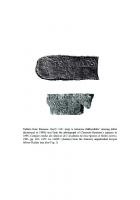The Alalakh Tablets 1912090856, 9781912090853
This volume deals with the cuneiform tablets discovered by Sir Leonard Woolley in his excavation at Atshana, as interpre
143 31 33MB
English Pages 232 Year 2017
CONTENTS
ABBREVIATIONS
INTRODUCTION
APPENDIX
Recommend Papers

- Author / Uploaded
- D. J. WISEMAN
File loading please wait...
Citation preview
THE ALALAKH TABLETS by
D.
J.
WISEMAN
Published by
THE BRITISH INSTITUTE OF ARCHAEOLOGY AT ANKARA 56 QUEEN ANNE STREET LONDON, W.l 1953
OCCASIONAL PUBLICATIONS OF THE BRITISH INSTITUTE OF ARCHAEOLOGY AT ANKARA No.
2
THE ALALAKH TABLETS by
D.
J.
WISEMAN
Published by
THE BRITISH INSTITUTE OF ARCHAEOLOGY AT ANKARA 56 QUEEN ANNE STREET LONDON, W.l 1953
PRINTED IN GREAT BRITAIN BY C. TINLING AND CO. LTD. LIVERPOOL, LONDON AND PRESCOT
FOREWORD This volume is the second of the series of Occasional Publications designed by the Council of the British Institute of Archaeology at Ankara to give a fuller account by specialists of particular pieces of research than would be possible in the annual volume of Anatolian Studies. It deals with the cuneiform tablets discovered by Sir Leonard Woolley in his excavations at Atshana, as interpreted by D. J. Wiseman, Assistant Keeper in the Department of Egyptian and Assyrian Antiquities of the British Museum. The book forms an appropriate companion to No. 1 of this series, The Statue of Idri-mi, by Professor Sidney Smith, which was published in 1949. On behalf of the Council, joHN GARSTANG,
Chairman.
December, 1952.
PREFACE It is always interesting when something new from the ancient Near East is to be published, and especially is this so when documents reveal the thoughts and life of peoples living in a city whose existence was otherwise barely known. As a result of Sir Leonard Woolley's expedition to Tell 'Atshanah (ancient Alalab-) in the plain of Antioch from 1937-49, much new knowledge has been won. Professor Sidney Smith paved the way for this study by his preliminary report on the tablets (Antiquaries' Journal, XIX, 1939) and his publication of the difficult inscription on the statue of Idrimi ( Occasional Publications of the British Institute of Archaeology at Ankara No. 1). My thanks are due to him not merely for suggesti:J;lg this work but also for his wise counsel from the earliest days of my Assyriological studies. My colleague Mr. C. J. Gadd, Keeper of the Department of Egyptian and Assyrian Antiquities at the British Museum, has kindly read through the manuscript and contributed many helpful suggestions and criticisms and much encouragement. Professor Georges Dossin, the energetic publisher of the great French discovery of the Mari tablets, has done the same, but to none of these scholars can be attributed the many blemishes which mark, I am well aware, this attempt to present a large body of new material without undue delay. With the permission of the Director-General of Antiquities of the Turkish Republic I was enabled to study the tablets found during the 1946-49 excavations at Alalakh. Bay Ruhi Tekan, the· Curator of the Antakya Museum, helped me in every possible way during my visit for this purpose in 1950. The serious charge of publishing this book was undertaken by the British Institute of Archaeology at Ankara, with the enlightened purpose of thus completing presentation of all the inscribed material found at Alalakh ; but the cost could not have been borne without the liberal assistance contributed by the Australian Institute of Archaeology, Melbourne, through Mr. W. ]. Beasley, and also by the Griffith Institute in the Ashmolean Museum, Oxford, and by Professor M. E. L. Mallowan, who has always worked to ensure that the interpretation of the archaeological evidence should be supported by whatever ancient documents have a bearing on it. I hope the scientific value of these new texts, imperfectly as it is extracted here, may be thought not unworthy of such generous aids. 11
CONTENTS PAGE
Foreword by Professor
J.
Garstang
Preface
11
Contents ..
lll
Abbreviations
IV /
l.
INTRODUCTION
General Excavations-preliminary reports-provenience of tablets -numbers of tablets-condition
1
Historical Background Level VII (18th century B.C.)-date formulae-month names-Level IV (15th century B.C.)
2
Geographical
R~ferences
8
Population Evidence from personal names-race-designation of classes-professions and occupations
8
Industry and Produce Crafts-wood and metal working-silver and goldcopper and bronze-weights and measures-husbandrywool and garments . .
13
Religion and Culture The temple-pantheon-·priests-literary or school textscases before the king-seal impressions
16
Language General-orthography-grammar . . II.
III.
IV.
\. 18
CATALOGUE of the Tablets (List of Contents on p. 23) Appendix, Hittite Incantation, by Dr. 0. R. Gurney.. Register of Excavation and Publication Numbers Division of the Alalakh Tablets
25 116 119 123
INDICES (i) (ii) (iii) (iv)
125 154 158 160
Personal Names .. Place Names Professions and Occupations Selected Vocabulary
End
PLATES I-LVIII iii
ABBREVIATIONS * AASOR AC AfO AJ AJSL BAS OR DAB JAOS JCS JHS JNES LAB MPND RA SI ZA
Indicates texts from Level VII (18th century B.C.)-see p. 2. Annual of the American Schools of Oriental Research. Sidney Smith, Alalakh and Chronology, London, 1940. Archiv fiir Orieniforschung. Antiquaries' Journal. American Journal of Semitic Languages. Bulletin of the American Schools of Oriental Research. R. Campbell Thompson, Dictionary of Assyrian Botany. Journal of the American Oriental Sociery. Journal of Cuneiform Studies. Journal of Hellenic Studies. Journal of Near Eastern Studies. R. Labat, L' Akkadien de Boghaz-Koi, Bordea~x, 1932. D. Cross, Movable Property in the NU


![The Sultantepe Tablets 2 [2]
0995465681, 9780995465688](https://ebin.pub/img/200x200/the-sultantepe-tablets-2-2-0995465681-9780995465688.jpg)



![The Sultantepe Tablets I [1]
0995465673, 9780995465671](https://ebin.pub/img/200x200/the-sultantepe-tablets-i-1-0995465673-9780995465671.jpg)

![The Tell el Amarna Tablets [2 ed.]](https://ebin.pub/img/200x200/the-tell-el-amarna-tablets-2nbsped.jpg)
